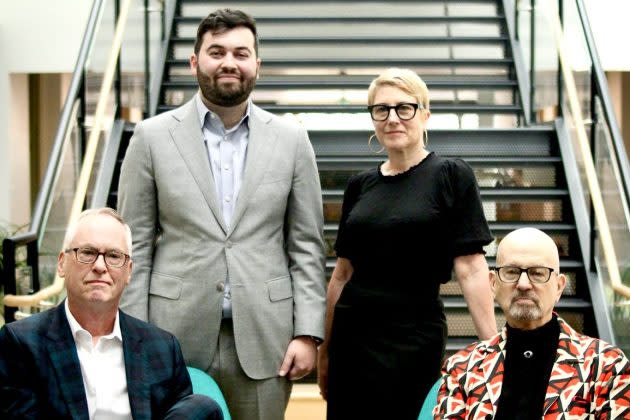Reading the Room: How IAG Built a Small-But-Mighty Media Rights Department

The small-to-midsize talent agency has had it bad — maybe worse than most — in Hollywood over several turbulent years. Consolidation, financial cutbacks, labor strikes and inflation have impacted indie players in the representation space since 2020, even as giant competitors like CAA and WME keep scaling up.
Still, there’s lemonade to be made in a climate where buyers (albeit stingier ones) need content. So it has been at Independent Artists Group, a shop that has used the economic downturn and rampant corporate compression to its advantage — not only in recruiting top agents lost to M&A, but quietly building formidable teams like its media rights group, which works with top fiction and nonfiction authors to farm adaptations for film, TV, podcasts and more.
The department consists of founding agent Steve Fisher, Debbie Deuble Hill, 17-year company vet Alec Frankel (who came up from the mailroom) and Ron Bernstein — who has represented Nobel, Pulitzer and Booker prize winners like Margaret Atwood. While the agency isn’t as stratospheric as some competitors, its clients have dominated the New York Times Best Sellers list in the first two quarters of 2024. The IAG roster accounts for hot recent series adaptations like Amazon’s “Reacher” (based on the books by Lee Child), and includes a huge indie publisher that’s looking to build a meaningful production entity (Entangled, behind Rebecca Yarros’ “Fourth Wing” juggernaut and Tracy Wolff ’s romantic thriller series “Crave”). The agency also just bagged Ken Follett, the prolific historical fictional writer whose “The Pillars of the Earth” is a veritable classic, who shows no signs of slowing down. Mind you, this is a team of four — a fraction of some of the media rights teams at other agencies. The health of the department has resulted in the most precious of show business commodities these days: optimism.
“Our competitors have a media rights department because they want to serve other clients in the agency. They want to placate their big screenwriters and directors,” says Fisher. “For us, our authors are our stars. They’re our focus. It’s about what’s best for the book, and how do we put it out in the marketplace as meaningfully as possible?”
IAG comprises two legacy companies, merged and renamed a year ago when Agency for the Performing Arts joined with music touring powerhouse Artist Group International. Jim Osborne runs the combined entity, a partnership that many in the industry view as having solidified its future as the largest alternative to the “Big 3” agencies. (especially as peer companies like Verve and A3 have spun into turmoil). He’s referred to his media rights team as “the tip of the spear” for business at his firm.
“Fourth Wing” and its sequel, “Iron Flame,” are both set up at Amazon Prime as series. Hannah Nicole Maehrer’s “Assistant to the Villain” is at Legendary. John Connolly’s beloved novels about the detective Charlie Parker is in early development at Village Roadshow, and has Colin Farrell and Bryan Cranston among its attached producers*. The influx of deals comes at a time when the machinery of the industry is barely cranking.
“The speed with which things happen has never been slower,” notes Bernstein, decked out in a geometric-patterned blazer with adornments a sage in one of his clients’ novels might wear. “Getting a contract, getting paid, is an ordeal. And more and more, people need to sign off on a deal at certain levels.”
What sets the nimble group apart, they say, is their willingness to interface directly with authors while respecting the sanctity of their publishing agents — and helping writers navigate transformative digital trends like BookTok (a corner of TikTok that has spurred physical book sales among young consumers and generated billions of impressions).
“Authors want to get involved. They want agency. We ask what their expectations are: Do they want to adapt? Do they want to produce? Do they want a consultancy?” says Deuble Hill.
Some problems are not so easily solved. Bernstein notes a shortage of physical paper in recent years. He recalls one instance where paper reserves for a book sequel had to be ordered six months in advance before anyone was sure the first installment would be a hit.
Perhaps it’s time for the agents to plant more than metaphorical trees.
*While the Charlie Parker adapted series is in early development, full producers alongside Village Roadshow Television include Michael Gaeta and Alison Rosenzweig of their eponymous company, Farrell and sister Claudine Farrell for Chapel Place Productions, and Cranston and James Degus for Moonshot Entertainment.
Best of Variety
Sign up for Variety’s Newsletter. For the latest news, follow us on Facebook, Twitter, and Instagram.

